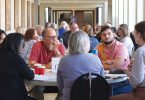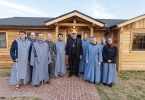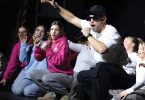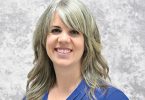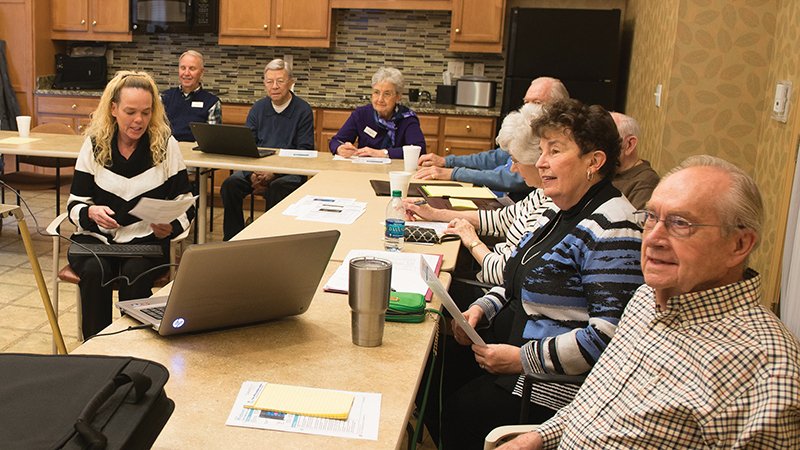
Larri Brooks,left, leads the computer club at Santa Marta retirement community in Olathe. The club helps residents meet the challenges that come in the digital age. Pictured, clockwise from left, are Santa Marta residents: Bill Poehling, Wally Drone, Naomi Kennedy, Louis C. Rasmussen, Howard Earnhardt, Marie James, Mary Duerst and Jerry Stephenson. LEAVEN PHOTO BY JOE BOLLIG
by Moira Cullings
moira.cullings@theleaven.org
OLATHE — They might be “digital immigrants,” but that doesn’t stop them from settling nicely into the vast world of technology.
Residents at Santa Marta retirement community in Olathe are meeting the challenges that come with the digital age head-on through a monthly computer club.
“Digital immigrants,” unlike “digital natives” who have grown up in a world of smartphones, Google and social media, were born before the widespread use of digital technology and have had to make a conscious transition into the digital world.
But it’s not slowing the Santa Marta folks down.
“I probably won’t keep up with all of [the changes],” said resident Wally Drone, “but I’ll have my foot in the door.”
With positive attitudes and a patient instructor, residents like Drone are taking the tech world by storm.
One lesson at a time
After moving to Santa Marta with his wife Louanne this past November, Drone began taking advantage of the club to stay up-to-date on emails and Microsoft programs.
Before his move to Santa Marta, Drone was an active parishioner at Queen of the Holy Rosary in Overland Park.
“I played the organ there and directed the choirs through the years,” he said. “I just completed 57 years as the music person at Queen.”
Now, Drone plays for the weekend Masses at Santa Marta.
“I put all [the music] on the computer, and then we distribute it to the cantors,” he said.
Understanding how to use programs like Microsoft Excel and Microsoft Word are essential to Drone’s music ministry, as they provide him simple ways to track and distribute each Sunday’s music.
That’s where the computer club comes in.
Created around 2010 by community residents, the club is now instructed by Larri Brooks, who began her work at Santa Marta five years ago while she was a technician for Microsoft.
Now that she works for the University of Kansas Hospital, Brooks continues to dedicate one day a month — and sometimes more, depending on the residents’ needs — to teaching the computer class at the retirement community.
Resident Mary Duerst also attends the class. She says Brooks not only gives them lessons on how to use various software, but also addresses issues like security.
Duerst manages the club and schedules its monthly class, which includes computer training as well as help with other technological devices like smartphones and iPads.
Twelve residents attend the class regularly, and the current focus is on mastering Microsoft Windows 10.
“We’re still just learning the bare necessities of it,” said Drone. “For most people, probably their big thrust will be the internet and emails.”
“As far as the phones, [the focus is] smartphones and technology for messaging, that sort of thing,” he continued.
Staying connected
For the majority of the computer club members, knowing how to connect with family and friends through Skype, email and other outlets is a main reason they participate.
Many residents have family members who can’t visit as often as they’d like, so being able to connect via technology is very important.
Often, those loved ones are surprised by how up-to-date their family members at Santa Marta have stayed on technological advancements.
“Our kids can’t believe it!” said Duerst.
A challenge the club helps its members overcome is adapting to the constant changes of their devices.
“I was a computer teacher for [Notre Dame de] Sion High School (in Kansas City, Missouri) for 20 years,” said Duerst.
“But I taught on Macintosh, and now we’re using Windows, so I’m like a baby,” she added.
But Brooks meets them where they’re at.
“She seems to bring it down to our level, which is not at a really high point,” said Drone. “But everybody seems interested in the program.”
For Brooks, the residents at Santa Marta are like family.
“Our computer club grows daily,” she said. “These ladies and gentlemen are fun and always full of questions. They love technology and [are] always ready to learn.”
Brooks goes above and beyond her duties by making apartment visits to residents who can’t make it to the class.
“My motivation is watching the face of someone when you fixed their problem or taught them something they think is amazing,” she said.
The residents are grateful for the work Brooks puts into their club.
“The most helpful thing she does is come when we have an emergency,” said Duerst.
“She’s so available to us — that’s our blessing,” she added.
In turn, Duerst’s favorite part of the club is ”the fact that we’re helping so many residents.”
That help, she hopes, will continue to enable these “immigrants” to find their way around this digital world for many years to come.

